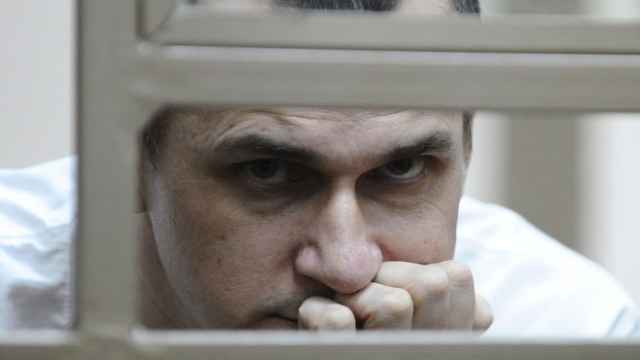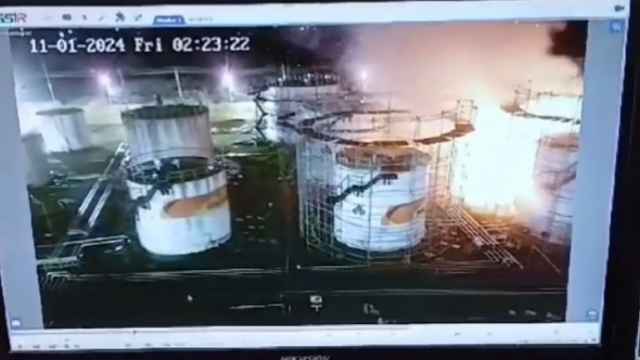A Russian military court sentenced Ukrainian film director Oleg Sentsov, who opposed the Kremlin's seizure of the Black Sea region of Crimea last year, to 20 years in a high-security prison on Tuesday after finding him guilty of masterminding a terrorist campaign.
Sentsov, who said he was beaten and threatened with rape in Russian custody, denied all the charges and has been designated a political prisoner by human rights groups and Western governments.
The North Caucasus District Military Court in the southern Russian city of Rostov-on-Don also found co-defendant Alexander Kolchenko guilty on terrorism charges and handed him 10 years behind bars.
Sentsov, 39, and Kolchenko, 26, laughed and whispered to each other during the sentencing, which took less than 20 minutes to read out. At one point, Sentsov put his arm around Kolchenko and the two sang the Ukrainian national anthem, ending their rendition with a shout of “Glory to Ukraine!”
The case has provoked an international outcry with prominent European film directors including Britain's Ken Loach, Germany's Wim Wenders and Spain's Pedro Almodovar, calling on President Vladimir Putin to free Sentsov. There has been less public support from Russia's cultural elite, but directors Nikita Mikhalkov and Andrei Zvyagintsev have both publicly called for his release.
“Stay strong, Oleg,” Ukrainian President Petro Poroshenko wrote on Twitter after the sentence. “The time will come when those who organized this show trial will be in the dock themselves.”
Relations between Kiev and Moscow have deteriorated rapidly since popular demonstrations toppled pro-Russian Ukrainian President Viktor Yanukovych last year, leading to the annexation of Crimea and Moscow's backing for separatist rebels fighting Ukrainian troops in the east of the country.
Sentsov's trial was “patently unfair” and “marred by credible allegations of torture,” international human rights organization Amnesty International said in a statement Wednesday.
“It played into Russia’s propaganda war against Ukraine and was redolent of Stalinist-era show trials,” said Heather McGill, a researcher at Amnesty International, according to the statement.
Geoffrey Pyatt, the U.S. ambassador to Ukraine, described the legal proceedings as a “Russian farce” on Twitter while the British government condemned “politically motivated charges” against Sentsov.
U.S. officials have previously said Sentsov and Kolchenko were “hostages” and many experts believe that their only chance of freedom is a prisoner swap with Ukraine, which is holding several men it claims are Russian soldiers captured fighting alongside anti-Kiev rebels.
The Kremlin denies that Russia has political prisoners. Vladimir Markin, spokesman for Russia's powerful Investigative Committee, told Izvestia newspaper earlier this week that Sentsov's case was not political and labeled such accusations as “propaganda” spread by the United States.
Arrested by Russia's Federal Security Service, or FSB, in Crimea in May last year, Sentsov, was found guilty of collaborating with Ukraine's Right Sector nationalist group to commit two arson attacks against pro-Russian organizations in Crimea, plotting to blow up a statue of Lenin in the regional capital of Simferopol and illegal arms possession.
Sentsov maintained throughout proceedings that Russia has no authority to try him — having allegedly issued him a Russian passport without his consent.
“A court of occupiers cannot by definition be fair,” Sentsov said in his closing remarks last week.
The sentences for Sentsov and Kolchenko were slightly less than those requested by prosecutors who asked for 23 and 12 years respectively.As a result of recent legislation, terrorism charges in Russia are now tried exclusively in military courts.
Kolchenko, a left wing activist, admitted that he took part in the fire-bombing of the offices of the ruling United Russia party in Crimea last year but denied the accusations of terrorism and rejected the suggestion that he took orders from Sentsov. There were no casualties in the attack.
“We were counting on a lighter sentence but we got 20 years like the FSB officers who detained Sentsov promised him. We will appeal in the Supreme Court,” Sentsov's lawyer Dmitry Dinze said after the sentencing, Radio Liberty/Radio Free Europe reported Tuesday.
Sentsov said last year that he was tortured following his detention — alleging that he was beaten, stripped naked and threatened with being raped with a stick. During the trial, prosecutors said Sentsov's injuries were a result of a sadomasochistic sex game prior to his arrest.
Lawyers representing Sentsov highlighted that much of the evidence used against him and Kolchenko was derived from dubious testimony, apparently given under torture.
Prosecutors relied heavily on evidence from Gennady Afanasyev, also arrested last year in Crimea, who later retracted his words, saying he was tortured. His lawyer, Alexander Popkov, told radio station Ekho Moskvy on Aug. 8 his client was beaten during questioning, drugged, forced to wear a gas mask pumped full of smoke, stripped naked, deprived of sleep and threatened with rape.
“I won't be able to live with myself if I don't tell the truth,” Afanasyev said, according to Popkov.
Afanasyev, 23, was sentenced to seven years in prison by a Moscow court in December for terrorism. Another alleged member of the same terrorist cell, Alexei Chirny, was sentenced to seven years in a high security prison in April by a court in Rostov-on-Don.
Both men admitted their involvement in arson attacks last spring in Crimea, which did not cause any casualties, under the leadership of Sentsov. No-one was injured in the attacks.
Sentsov, who has two young children, was known as a promising filmmaker and a pro-Ukraine activist who opposed Russia's takeover of the Crimean Peninsula. He reportedly took food to Ukrainian troops barricaded in their bases by Russian special forces during the annexation of the region last year.
Ukraine has said that there are at least ten other Ukrainian citizens being held in Russia on political charges — most face long sentences and human rights advocates allege many have been tortured. The trial of Nadezhda Savchenko, a Ukrainian pilot accused of murdering Russian journalists who says she was kidnapped and taken across the border into Russia, is due to begin in the coming weeks.
Contact the author at h.amos@imedia.ru
A Message from The Moscow Times:
Dear readers,
We are facing unprecedented challenges. Russia's Prosecutor General's Office has designated The Moscow Times as an "undesirable" organization, criminalizing our work and putting our staff at risk of prosecution. This follows our earlier unjust labeling as a "foreign agent."
These actions are direct attempts to silence independent journalism in Russia. The authorities claim our work "discredits the decisions of the Russian leadership." We see things differently: we strive to provide accurate, unbiased reporting on Russia.
We, the journalists of The Moscow Times, refuse to be silenced. But to continue our work, we need your help.
Your support, no matter how small, makes a world of difference. If you can, please support us monthly starting from just $2. It's quick to set up, and every contribution makes a significant impact.
By supporting The Moscow Times, you're defending open, independent journalism in the face of repression. Thank you for standing with us.
Remind me later.





